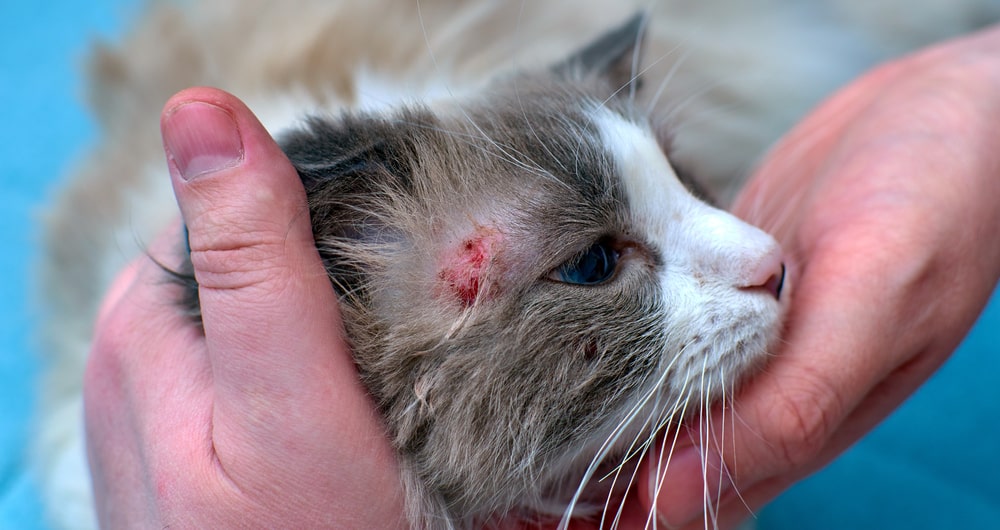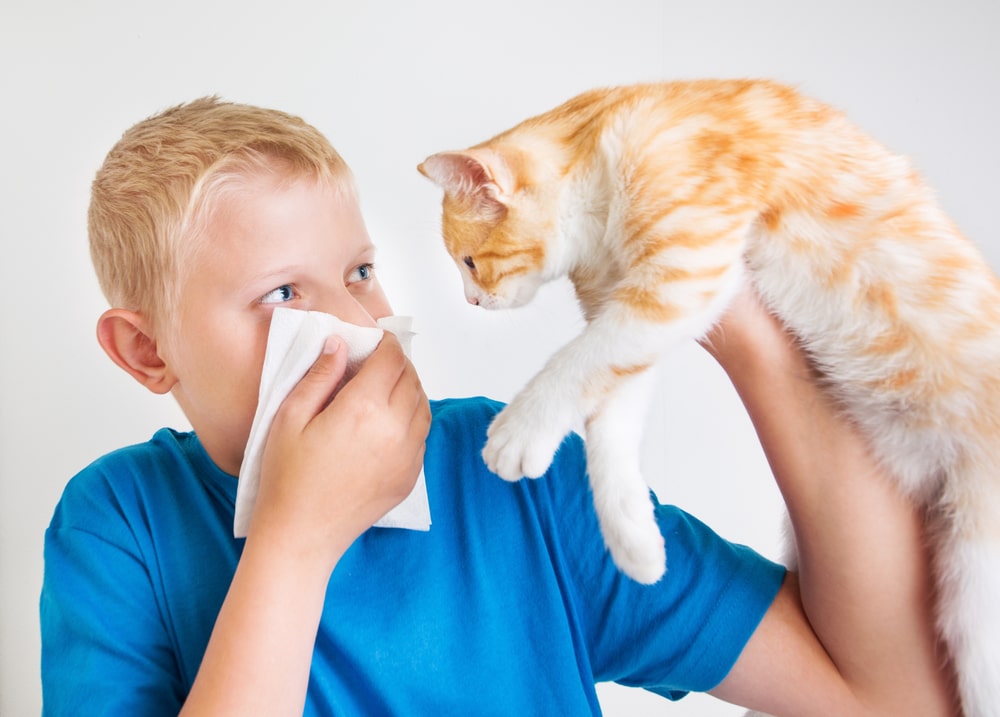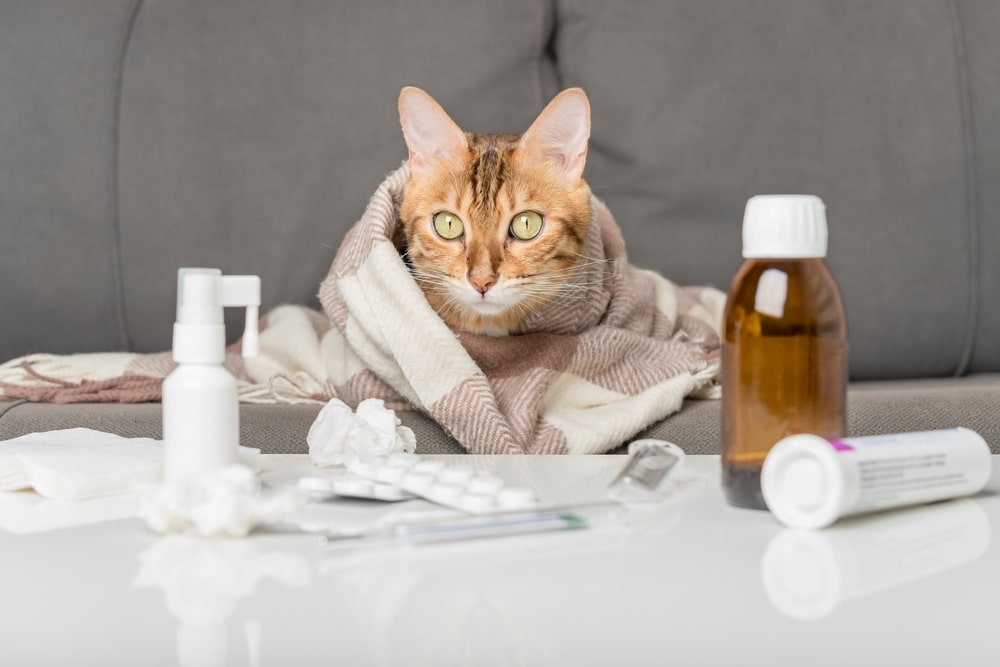Best Allergy Meds for Cat Allergies
An allergy is the result of the immune system’s overreaction to an allergen, which is a foreign substance, by the body. The undesirable symptoms are brought on by our body’s overreaction to allergens, which are innocuous in and of themselves. Cat allergies affect millions of people worldwide, leading to sneezing, itching, watery eyes, and other uncomfortable symptoms.
While cats are beloved companions for many, some individuals find themselves grappling with allergic reactions in their presence. In this blog, we will explore the causes of cat allergies, shedding light on the various allergens responsible for these reactions, and the best allergy meds for cat allergies.
What causes cat allergies?

Cat allergies are primarily triggered by exposure to certain proteins produced by cats. The primary culprit responsible for cat allergies is a protein called Fel d 1. Here’s a breakdown of the main factors contributing to cat allergies:
- Fel d 1 Protein: Fel d 1 is a protein found in the skin’s sebaceous glands, saliva, and urine of cats. When cats groom themselves, the protein is transferred to their fur. As cats shed hair and skin cells, these particles carry Fel d 1. The protein can become airborne and circulate in the environment, leading to exposure for individuals even in the absence of direct contact with a cat.
- Airborne Particles: Cat allergens, including Fel d 1, are small and lightweight, making them easily airborne. This characteristic allows the allergens to travel through the air and settle on various surfaces within the living environment. Even in homes without cats, cat allergens can persist, carried in on clothing or shoes, contributing to the widespread prevalence of cat allergies.
- Saliva and Urine: When cats groom themselves, they transfer saliva containing Fel d 1 onto their fur. This behavior spreads the allergen throughout the cat’s coat. Fel d 1 is also present in cat urine. In homes with indoor cats or shared living spaces for multiple cats, the allergen can become airborne as the urine dries, further contributing to allergic reactions.
- Breeds and Allergenicity: While certain cat breeds are often considered less allergenic than others, there is no truly hypoallergenic breed. The production of Fel d 1 varies among individual cats, even within the same breed. Some breeds, such as the Siberian cat, Balinese, and Devon Rex, are reported to produce fewer allergens.
Types of Allergies in Cats:

Cat allergies can be broadly categorized into three main types: flea allergy, environmental or inhalant allergy, and food allergy. Here’s an overview of each type:
- Flea Allergy Dermatitis(FAD): Flea allergy dermatitis, or flea-bite dermatitis as it is commonly known, usually affects people who have developed an allergy to flea saliva. Bite sites usually turn into papules in sensitized people, leading to papular urticaria, which frequently includes wheals, particularly in young children.
- Environmental or Inhalant Allergy: Airborne allergies are brought on by innocuous chemicals that your body perceives as “foreign”. Your allergy symptoms, such as runny nose, congestion, and sneezing, result from this. Indoor allergens like dust mites and outdoor allergens like mold and pollen are frequently included in inhalant allergies.
- Food Allergy: An immunological response that happens shortly after consuming a particular food is known as a food allergy. Foods that cause allergies might cause symptoms like hives, inflamed airways, or digestive issues in even small amounts.
There exist the best allergy meds for cat allergies that one should take to overcome these problems.
What are the symptoms of allergies in cats?

Allergies in cats can manifest in various ways, and the symptoms can vary depending on the type of allergy and the individual cat.
Here are some common symptoms of allergies in cats:
- Itching and Scratching
- Skin Irritation
- Gastrointestinal Issues
- Sneezing and Watery Eyes
- Runny Nose
- Ear Infections
- Swelling or Hives
- Coughing or Wheezing
If you suspect that your cat may have allergies, it’s crucial to consult with a veterinarian for a proper diagnosis. Allergy testing, elimination diets, and other diagnostic tools may be used to identify the specific allergen or trigger. Post diagnosis, one should visit the physician for the best allergy meds for cat allergies or specific allergies.
Cat allergy diagnosis:

Here are the key steps in the diagnosis of cat allergies:
- Clinical Examination: The veterinarian will conduct a thorough physical examination of the cat, paying attention to any visible signs of allergies. They will inquire about the cat’s medical history, including the onset and duration of symptoms, changes in behavior, and potential triggers.
- Symptom Analysis: Allergies in cats can manifest in various ways. Common symptoms include itching, scratching, hair loss, skin redness or inflammation, sneezing, watery eyes, vomiting, diarrhea, and changes in behavior.
- Flea Control: Flea allergy dermatitis is a common cause of skin issues in cats.
- Dietary History: For suspected food allergies, the veterinarian may inquire about the cat’s diet, treats, and any recent changes in food.
- Food Trial: A food trial involves feeding the cat a novel protein or hydrolyzed diet for a specified period, typically 8 to 12 weeks.
- Allergy Testing: Allergy testing may be conducted to identify specific allergens affecting the cat.
- Response to Treatment: If the cat’s symptoms improve with specific interventions, such as dietary changes, it can further support the diagnosis of allergies.
Best Allergy Meds for Cat Allergies:

Managing cat allergies often involves a combination of preventive measures, lifestyle changes, and medications. Here are some common allergy medications that can be effective in relieving symptoms associated with cat allergies:
Antihistamines:
- Common examples: Benadryl(Diphenhydramine), Claritin(Loratadine), Zyrtec(Cetirizine).
- Considerations: Dosage should be determined by a veterinarian, as the appropriate amount can vary based on the cat’s size and individual response.
Antihistamines are a class of medications commonly used to alleviate the symptoms of allergies, including those triggered by exposure to cats. Cat allergies are typically caused by proteins found in a cat’s saliva, dander (tiny skin flakes), and urine.
When a person with a cat allergy comes into contact with these allergens, their immune system reacts by releasing histamine, which leads to allergy symptoms. One of the best allergy meds for cat allergies.
Corticosteroids:
- Common examples: Prednisone, and Prednisolone.
- Considerations: Short-term use is often recommended due to potential side effects with long-term use. The dosage and duration should be determined by a veterinarian.
Corticosteroids, commonly referred to as steroids, are anti-inflammatory medications that mimic the effects of hormones produced by the adrenal glands. They are frequently used to manage various inflammatory conditions, including allergic reactions.
However, the use of corticosteroids for cat allergies is generally focused on relieving symptoms rather than treating the underlying cause.
Immunosuppressant:
- Common examples: Cyclosporine.
- Considerations: These medications are typically prescribed in cases of severe or chronic allergies. Regular monitoring by a veterinarian is essential.
Immunosuppressants are medications that suppress the immune system’s activity. They are commonly used in the treatment of autoimmune diseases, organ transplantation, and conditions where the immune system is overactive. However, they are not typically prescribed for the treatment of allergies, including cat allergies.
Allergy Shots(Immunotherapy):
Considerations: Allergy shots are customized based on the specific allergens affecting the cat. The treatment plan is developed by a veterinarian.
Allergy shots, also known as allergen immunotherapy, are a long-term treatment option for individuals with allergies, including cat allergies.
These shots involve injecting small amounts of allergens (substances that cause an allergic reaction) into the body over time, to desensitize the immune system and reduce or eliminate allergic reactions.
Fatty Acid Supplements:
- Common examples: Omega-3 fatty acids.
- Considerations: These supplements are often used as complementary therapy. Consultation with a veterinarian is recommended to determine the appropriate dosage.
While fatty acid supplements may contribute to the overall health of a cat’s skin and coat, they do not directly address or eliminate the proteins that cause cat allergies. If someone is allergic to cats, it’s important to take measures to reduce exposure to allergens.
It’s crucial to note that while these medications can provide relief from symptoms, they may not address the underlying cause of the allergy. Identifying and minimizing exposure to the specific allergen is an essential part of managing cat allergies.
Additionally, all medications should be used under the guidance of a veterinarian, as dosages and potential side effects can vary based on the individual cat’s health and needs. These are some of the best allergy meds for cat allergies.
FAQs:
Can a cat have allergies?
Yes, Cats often have four forms of allergies: contact, atopic dermatitis(caused by mold, dust, and pollen), food allergies, and insects(fleas).
How to get rid of cat allergies naturally?
Regular grooming of the cat, Air purifiers, designated cat-free zones, hypoallergenic cleaning products, good ventilation, and steam cleaning are some of the ways to naturally get rid of cat allergy. The best is a cat-free zone.
Can cats be allergic to humans?
Both people and other pets(cats, dogs) go through the same process of allergic reaction. Rarely, cats may even have human allergies. Since humans bathe more frequently than most other animals and don’t lose as much hair and dead skin, which causes our allergies to pets, human allergies are very infrequent.
Can cats have seasonal allergies?
Yes, cats can also develop seasonal allergies.
Can cat allergies go away with exposure?
For some fortunate individuals, cat allergies eventually cause them to become immune. While there is a chance of this happening, additional exposure can potentially make allergic reactions worse which can be counted as the best meds for cat allergies. This can be the best allergy meds for cat allergies.

